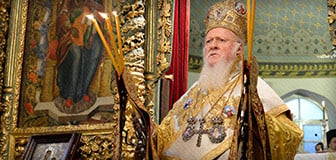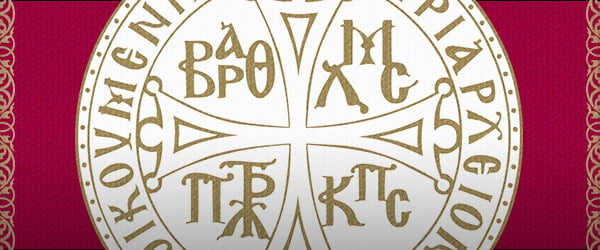The Ecumenical Patriarchate is also known as the Patriarchate of Constantinople or the Great Church of Christ in Constantinople. Its creation goes back to the year 38, the year in which the Church was founded in the ancient city of Byzantium by Saint Andrew, the "First-called among the Apostles".
Located for centuries next to the great and masterful Cathedral of Saint Sophia (and for this reason also called the Great Church), the Patriarchal See was moved to various parts of the city following the Fall of Constantinople in 1453. Since 1601, the headquarters of the Patriarchate have been in the ancient district of the Phanar.
The Patriarchate of Constantinople is the spiritual center of the Orthodox Church. It is seen as the Mother Church by the ancient Patriarchates of Alexandria, Antioch, Jerusalem, by the younger autocephalous Churches of Russia, Serbia, Romania, Bulgaria, Georgia, Cyprus, Greece, Poland and Albania,and by the autonomous churches of Czechoslovakia, Finland and Estonia.
The Patriarch of Constantinople is considered as the highest authority of the Orthodox Church. Since the sixth century he bears the title of Archbishop of Constantinople, the New Rome, and Ecumenical Patriarch. As "primus" (first) bishop of the Orthodox Church, the Ecumenical Patriarch undertakes various initiatives of Pan-Orthodox character, while coordinating relations between the other Churches of the Orthodox Communion, as well as relations between Orthodoxy as a whole and other Christian Churches or World Religions. Thus, he convokes and presides over councils and Pan-Orthodox meetings; consecrates the Myrrh (chrism) for all Orthodox Churches; grants autocephalous status to local churches which have become mature enough to be elevated to that ecclesiastical rank.
The ecumenicity of the Patriarchate of Constantinople has been ratified by two Ecumenical Councils: the second (Constantinople, 381) and the fourth (Chalcedon, 451). The primatial privileges of the Patriarch of Constantinople were also solemnly reconfirmed by the Council of Trullo in 691. These primatial prerogatives grant the Patriarchate of Constantinople the jurisdiction over all Orthodox Christians who live in countries where there is not a canonical, autonomous or autocephalous, Orthodox jurisdiction.
Other than the Archdiocese of Constantinople, the Ecumenical Patriarchate today comprises four other dioceses in Turkey (Chalcedon, Derci, Princes' Isles, Imbros and Tenedos). In Greece, the jurisdiction of the Ecumenical Patriarchate extends today over the Islands of the Dodecanese, Crete, Mount Athos and, spiritually, over the dioceses of Northern Greece. Moreover, following the recent emigration of Orthodox Christians from their native countries, this jurisdiction extends over various new dioceses created in Western Europe, the Americas, Australia and New Zealand.
The Ecumenical Patriarchate has performed a notable missionary task over the centuries, stretching from the conversion of Kievan Russia in the tenth century to the many missionary initiatives undertaken in the Far East during this century.
The Ecumenical Patriarchate is one of the most active centers of the modern ecumenical movement. As soon as 1902, it took the initiative of inviting all Orthodox Churches to take a stand on the possibility of renewing their contacts with other Christian bodies, including the Church of Rome, the Anglican Church and other Protestant denominations. As of then, contacts between the Patriarchate of Constantinople and non-Orthodox Churches have become both numerous and frequent. This attitude of openness culminated in the historic Encyclical of 1920 sent by the Ecumenical Patriarchate to all Christian Churches, calling their leaders to establish a closer relationship with each other. The concrete aim of this Encyclical was to promote the cause of Church unity by creating an organism called the League of the Churches of Christ, modelled after the League of Nations. It is generally recognized that the Encyclical of 1920 constituted one of the major factors which later brought to the creation of the World Council of Churches in 1948.
In the last decades the Ecumenical Patriarchate has promoted in particular the dialogue with the Church of Rome. Thus, today the Patriarchate, among other dialogical initiatives, leads the theological dialogues in progress with the Ancient Oriental Churches, the Church of Rome, the Churches of the Anglican Communion, the Churches of the World Lutheran Federation, the Reformed Churches, as well as with the monotheistic Religions of Judaism and Islam.
Moreover, the Ecumenical Patriarchate performs an intense activity within the framework of the recent ecological-environmental movement through the promotion of noteworthy Pan-Orthodox and ecumenical initiatives aiming at sensitizing its own faithful, and the world as well, on this important issue.

